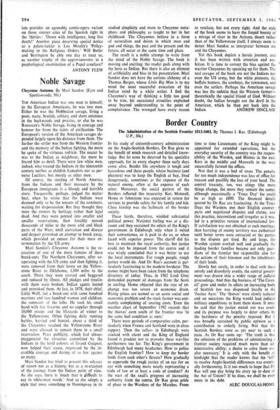Border Country
IN his study of sixteenth-century administration on the Anglo-Scottish Borders, Dr Rae gives us the benefit of much research and detailed know- ledge. But let none be deterred by his specialist approach, for in every chapter these early days come alive. Border life anywhere is tough and hazardous and these people, whose business (and pleasure) was to keep the English at bay, lived dangerously, sometimes at the expense of the natural enemy, often at the expense of each other. Moreover, the social pattern of the Borders reflected this insecurity. Ker, Maxwell, Home or Johnstone was expected in return for services to provide safety for his family and kin. Close kinship was the hallmark of the border society.
These lairds, therefore, wielded substantial political power. National feeling was at a dis- count and they sustained the edicts of the King's government in Edinburgh only when it suited their convenience, or it paid to do so, or when faced with superior power. The sheriff did his best to maintain the royal authority, but justice could not be imposed from the centre and it was wisely concluded that it was better to use the local instruments. For rough people, rough justice would do. And Dr Rae's account is par- ticularly fascinating to the modern borderer. The names might have been taken from the telephone directory of today. Thus, in 1562 Lord Grey demanded payment of damages from the Scots in sterling. Home objected that the rate of ex- change was too severe an economic drain. Rising prices are named as an acute social and economic problem and the stock farmer was con- stantly complaining of soaring costs. Even the weather chart of September 1592 records that the thieves' corn south of the frontier was In the same bad condition as ours.'
There were periods of comparative calm, par- ticularly when France and Scotland were in close rapport. Then the cellars in Edinburgh were stocked with claret and the King of England found it prudent not to provoke these war-like northerners too far. The King's government in Edinburgh had many headaches. How to police the English frontier? How to keep the border lords from each other's throats? How gradually to supersede the rough justice of an eye for an eye with something more nearly representing a rode of law or at least a code of conduct? At the start of the snail's progress of increasing authority from the centre, Dr Rae gives pride of place to the Wardens of the Marches. From time to time Lieutenants of the King might be appointed for extended operations, but the everyday security of the country was the respon- sibility of the Warden, and Humes in the east, Kers in the middle and Maxwells in the west successfully farmed the offices.
Not that it was a bed of roses. The penalty for too much independence was loss of office for treason and possibly the loss of your head. The central treasury, too, was stingy (the more things change, the more they remain the same), although occasionally a 'Truce Day' fee could be as high as £800. The financial details quoted by Dr Ikae- are fascinating. At the Truce Days the Wardens met their English counter- parts and negotiated _disputes and claims, and this practice, intermittent and irregular as it was, led to a primitive version of international law. If satisfaction was not obtained at such meetings, then harrying of enerriy territory was authorised until better terms were extracted or the parties to the dispute got tired. By and large, the Warden system worked well and gradually the leading border families became not only guar- dians of the frontier but responsible also for the actions of their kinsmen and the inhabitants of their lands.
Slowly but surely, in order to deal with these unruly and disorderly events, the central govern- ment was drawn into a wider range of judicial proceedings. And thus the business of The Coun- cil' grew and under its edicts an increasing body of Scottish law was dispensed locally in the 'Justice Ayre.' The 'thieves' were slowly isolated and on occasions the King would lead judicial military expeditions to hunt them down. It must be said that the justice meted out was crude and its purpose was largely to deter others by the harshness of the penalty imposed. But it was broadly sustained by public opinion as a contribution to orderly living. Not that the Scottish Borders were as yet near to such a 'state. As Dr Rae sums up: 'The truth is that the solutions of the problems of administering a frontier society required much more than ad- ministrative ability; a desire to solve them was also necessary.' It is only with the benefit of hindsight that the reader knows that the 'will' to resolve Anglo-Scottish differences was eventu- ally forthcoming. Is it too much to hope that Dr Rae will one day bring his story up to date of the Act of Union? If he does, we shall be even more in his debt.
ALEC DOUGLAS-HOME






























 Previous page
Previous page